CHINESE LITERATURE IN TRANSLATION: READING CHINA BEYOND THE LINE OF LANGUAGE

SPECIALIST COURSE: 50 Years of EU-China Relation

WORKSHOP: Reinterpreting Tradition in Contemporary China
Francqui Foundation Workshop, July 4, 2025, Ghent University

Programme
Welcome and Opening Remarks (08:45-09:00)
Bart Dessein, Francqui Research Professor Ghent University
Session One (09:00-10:00)
Chair: Bart Dessein
Jasper Roctus (Ghent University): “Action Is Easy, Knowledge Is Hard: The Legacy of Sun Yat-sen’s Criticism of Wang Yangming’s Unity of Knowledge and Action (知行合一)”
Xiaozhou Zou (Ghent University): "Self, People, and Political Activism: A Confucian Aspect of Li Dazhao's 李大釗 (1889–1927) Early Thought"
Coffee Break (10:00-10:30)
Session Two (10:30-12:00)
Chair: Jasper Roctus
Jyrki Kallio (Finnish Institute of International Affairs): “The Confucian revival and the instrumentalization of the concept Tianxia”
Jelena Gledic (University of Belgrade): “Chinese governance of contemporary international relations: applied Confucianism on a global scale”
Wang Yu-Zhou (Ghent University): “The Reinterpretation of Tianxiaism: Chinese Diplomatic Practice and Theoretical Innovation of “Chinese School”
Lunch (12:00-13:00)
Session Three (13:00-14:30)
Chair: Jelena Gledic
Ady Van den Stock (Ghent University): “Whose Universal Values? Revisiting a 2011 Debate among Mainland Chinese Confucians in Light of the Recent global Turn toward Radical Conservatism”
Yang Li (Ghent University): “The Revaluation of Confucian Tradition and Its Impact on China’s Internal State Structure and Functioning of the Party-State: 2012 to Present”
Lut Lams (KU Leuven): “Reconnecting Chinese Tradition and Modernity through Official Strategic Narratives and Initiatives”
Coffee Break (14:30-15:00)
Session Four (15:00-16:30)
Chair: Cristina Pinna
Matti Nojonen (University of Lapland): “Opening “the black-box” of Xi Jinping’s governance philosophy – a comparative analysis of Hanfeizi and current Leninist Party-State of Xi Jinping”
Bart Dessein (Ghent University): “Drinking Xi Wine”
Urmas Höbepappel (University of Tartu) and Mieke Matthyssen (Ghent University): “The role of playing dumb in China's political resilience".
Session Five (16:30-18:00)
Chair: Urmas Höbepappel
Mugur Zlotea (University of Bucharest): “‘Teaching the Socialist Core Values in Chinese Schools”
Cristina Pinna (University of Groningen): “The Concept of Self-Reliance and Higher Education Reform in Xi Jinping’s China”
Ngoc Nguyen Khuong Hong (Ghent University): “’First learn manners, then learn letters’ – The reevaluation of Confucian values in contemporary Vietnam”
Concluding remarks (the way forward) (18:00-18:15)
Drinks and dinner (18:30-)
WORKSHOP: EU - EAST ASIA RELATIONS IN A SHIFTING GLOBAL ORDER III
Ghent University - Egmont Institute - National Taiwan University - National Sun Yat-sen University
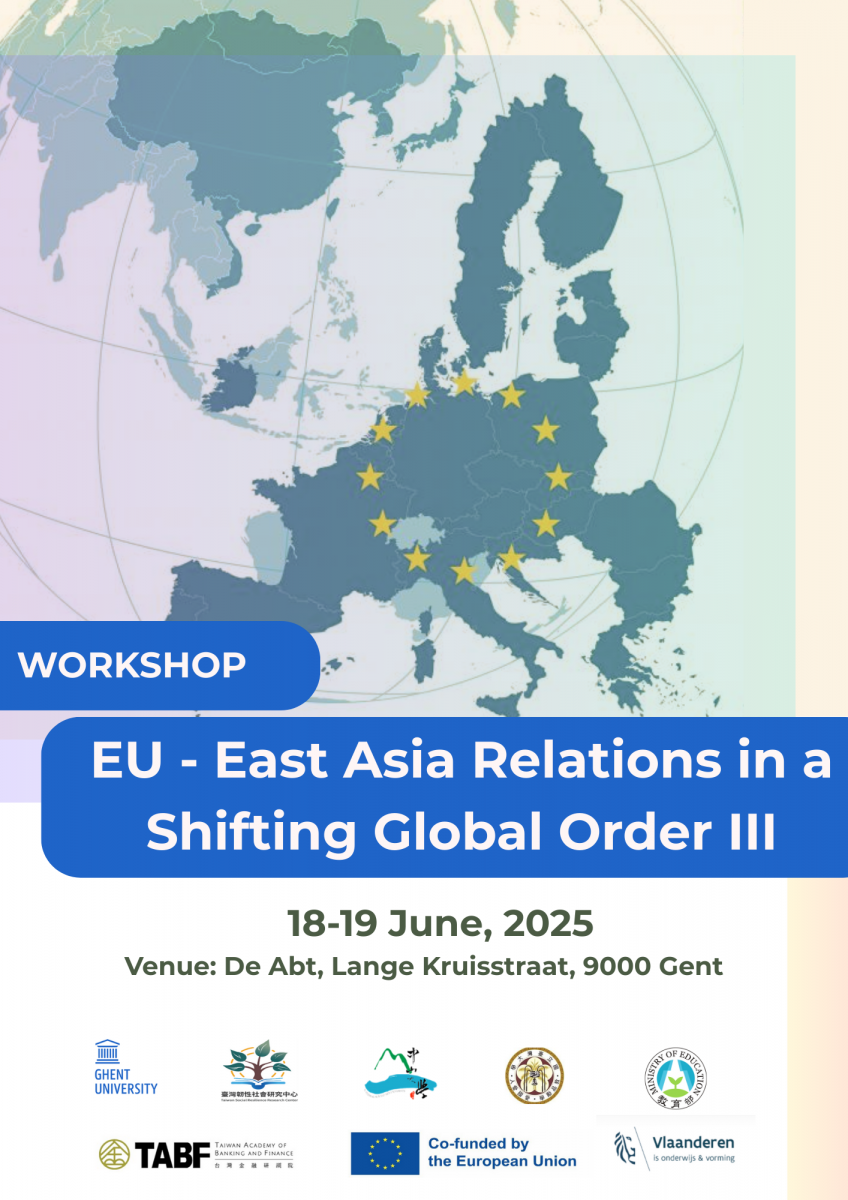
Agenda
(Updated: May 16, 2025)
Venue: De Abt, Lange Kruisstraat 4, 9000 Gent, Belgium
June 18, 2025
Welcoming Reception (18:00-20:00)
June 19, 2025
Opening Remark (09:10-09:20)
Prof. Dr. Bart DESSEIN (Ghent University & Egmont)
Prof. Dr. Ya-chi LIN (National Sun Yat-sen University)
Group Photos
Session 1 Europe and the Cross-strait Interaction (I) (09:20-10:50)
Chair: Chueiling SHIN (National Sun Yat-sen University)
- Bart DESSEIN (Ghent University & Egmont): Ye Jianying - an incrementalist approach.
- Wang Yu-Zhou (Ghent University): The Reinterpretation of Tianxiaism: Chinese Diplomatic Practice and Theoretical Innovation of ‘Chinese School’.
- Chueiling SHIN (National Sun Yat-sen University): EU-China-Taiwan relations in the New World Order during Trump 2.0.
Coffee Break
Session 2 Europe and the Cross-strait Interaction (II) (11:10-12:40)
Chair: Yih-Jye HWANG (Leiden University)
- Jasper ROCTUS (Ghent University & Egmont): Sun Yat-sen, Democracy, and Cross-Strait Relations: 'Revival Base' (復興基地) Taiwan as a Beacon of Freedom and Democracy to 'Unite China through the Three Principles of the People' (以三民主義統一中國)
- Yang LI (Ghent University): The Narrative Battle Over ‘De-risking’: China–EU Relations from 2022 to 2024.
- Yih-Jye HWANG (Leiden University): ‘Ukraine Today, Taiwan Tomorrow?’: Navigating U.S. Scepticism.
Lunch Break (12:40-13:40)
Session 3 Economic Issue (13:40-15:20)
Chair: Kuo-chun YEH (EU Jean Monnet Chair, National Taiwan University)
- Ya-chi LIN (National Sun Yat-sen University): The impact of global factors on RMB markets after Russo-Ukraine war.
- Shiang-yuan CHU (Justus Liebig University Giessen): TBA
- Ying-hsueh CHEN (National Sun Yat-sen University): Reproductive Autonomy under the Fertility Crisis: Taiwan's Draft Assisted Reproduction Act.
- Kuo-chun YEH (EU Jean Monnet Chair, National Taiwan University) and Shin-hui Chen (Chung-Hua Institute of Economic Research): Is Normative Power Still Valid? Theoretical Explanations and the Responses of Taiwan's Manufacturing to the EU's Industrial Policies.
Coffee Break
Round Table (15:30-16:00)
Prof. Dr. Nicole Yen-Yi LEE (Director, Department of Education, Taiwan Representative Office)
Prof. Dr. Joyce Yu-Jiuan LEE (Director General, Department of International and Cross-strait Education, Ministry of Education)
Secretary Ya-Ting Lin (Education Division,Taipei Representative Office in the European Union and Belgium)
Miss Lui (Section chief, Department of international education of MOE)
Group Photos
Concluding and Plan for a Special Issue (16:00-16:30)
Prof. Dr. Bart DESSEIN (Ghent University and Egmont)
Note:
- This workshop will be in English. Please send your draft (if available) or ppt by June 1, 2025 to Ya-chi LIN (yachilin@mail.nsysu.edu.tw).
- Please feel free to send a message to Ya-chi LIN (yachilin@mail.nsysu.edu.tw) if any question.
Financial support by Taiwan Social Resilience Research Center (Grant no. 114L900302) from the HESP by the MOE in Taiwan, Centre of Financial Stability, Taiwan Academy of Banking & Finance, and EU Jean Monnet Chair program is acknowledged.
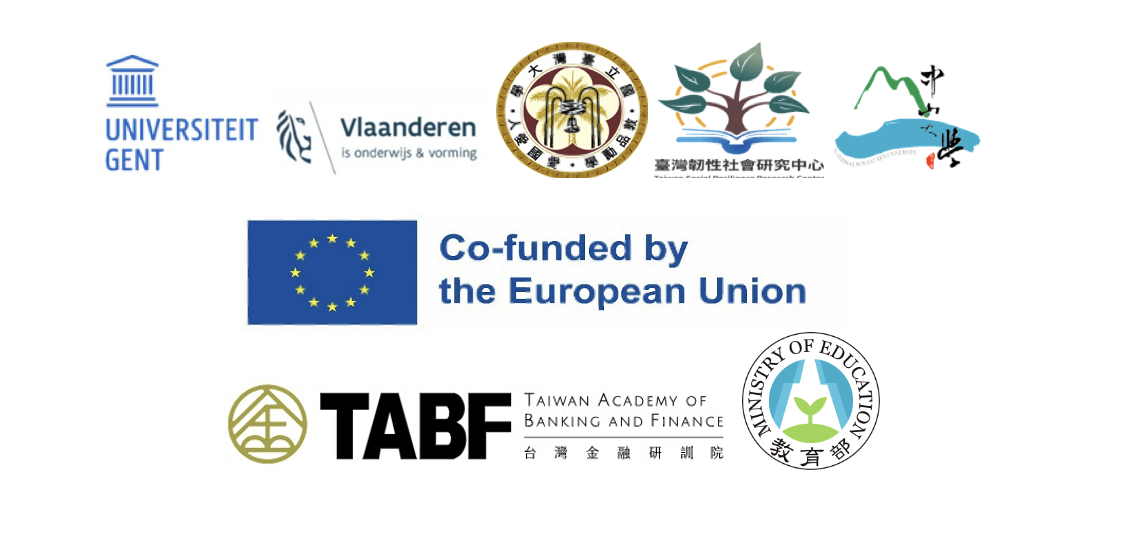
EU-CHINA AT 50: PROSPECTS FOR THE FUTURE
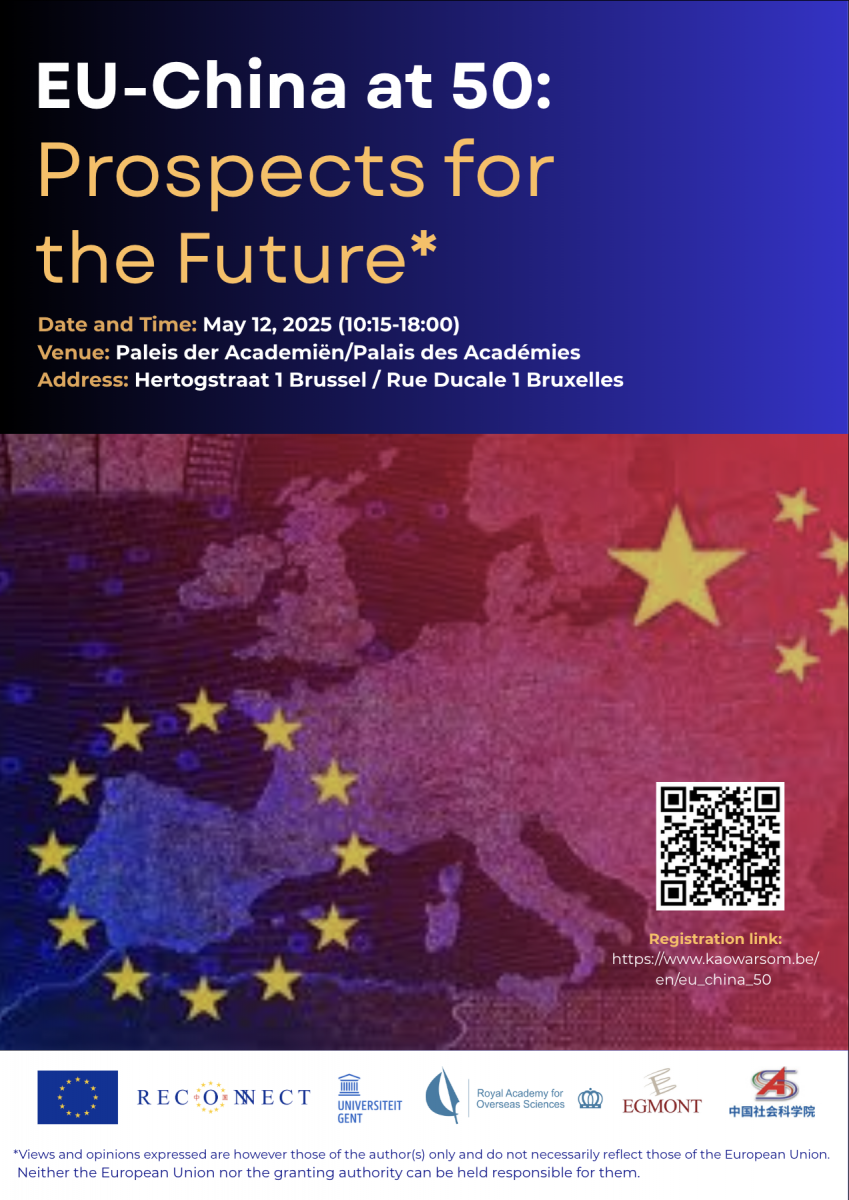
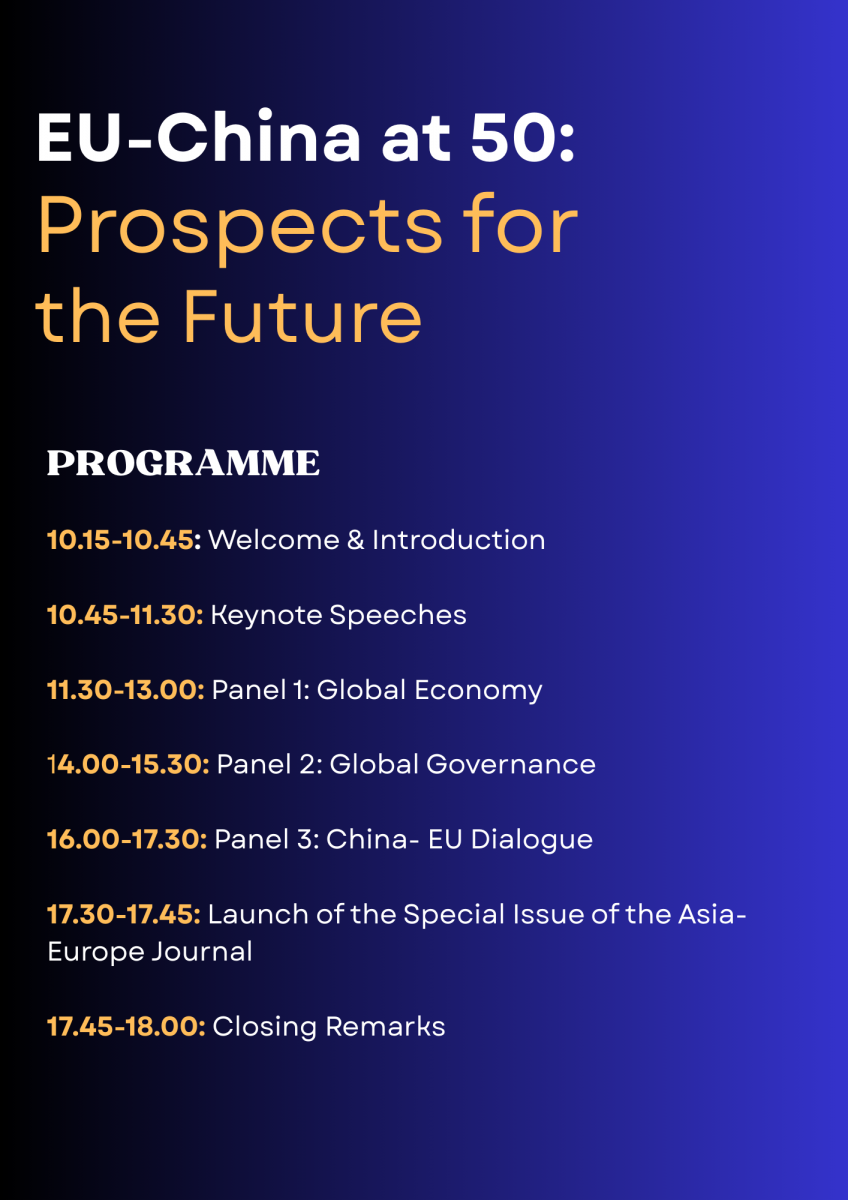
WORKSHOP: MIGRANT LABOUR IN GLOBALISED CONTEXTS
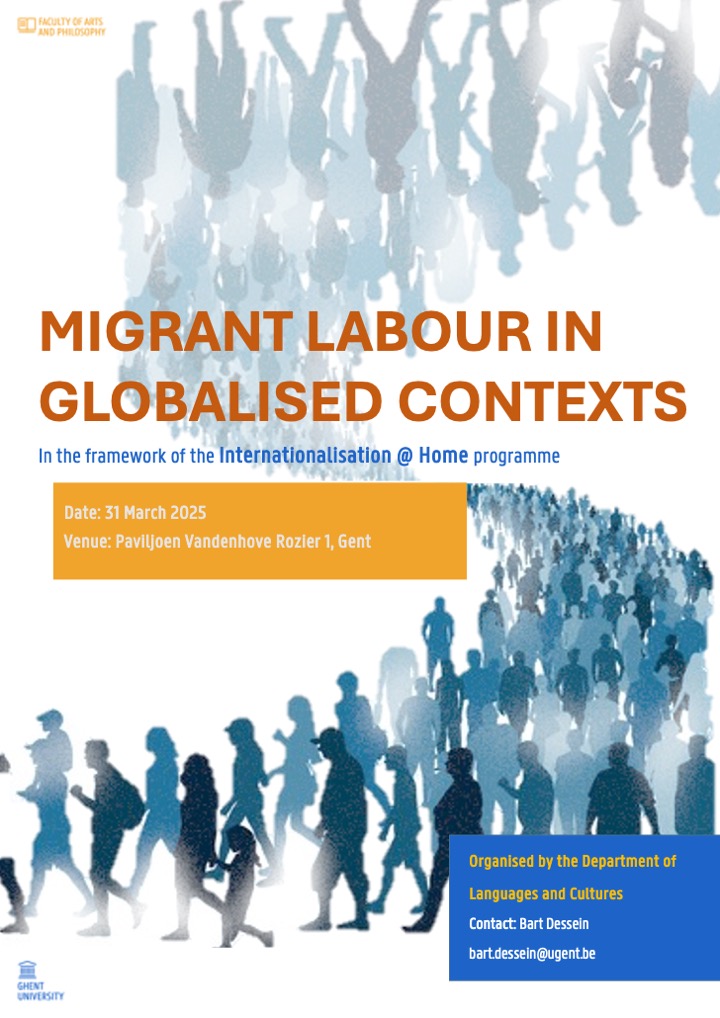
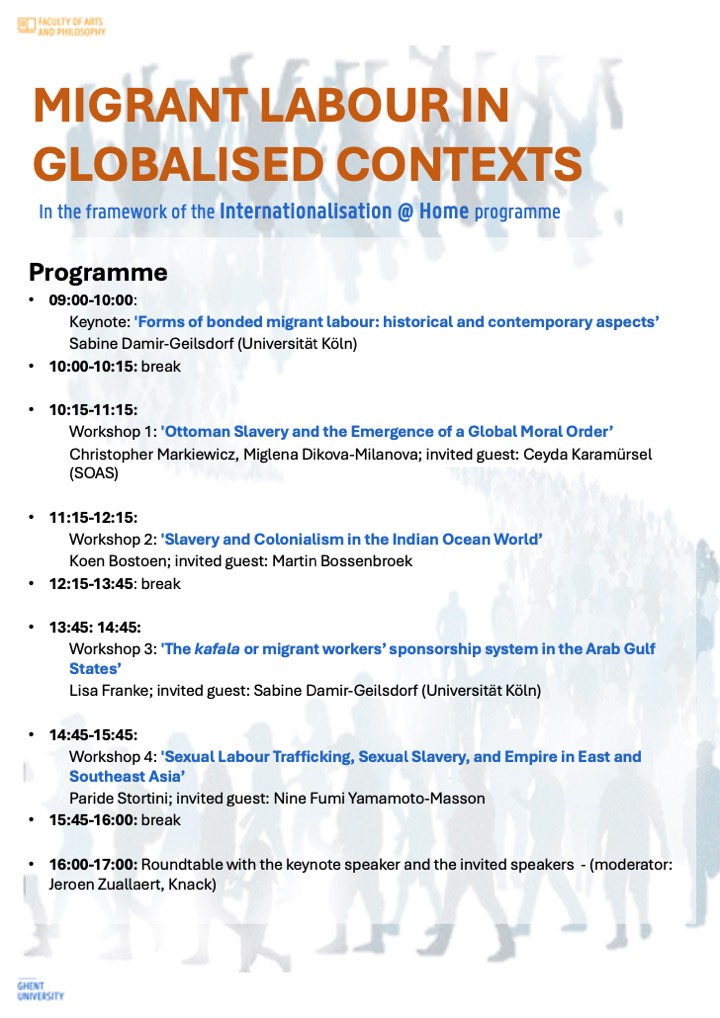
EAST ASIA PLATFORM: TAIWAN LECTURE SERIES 2025
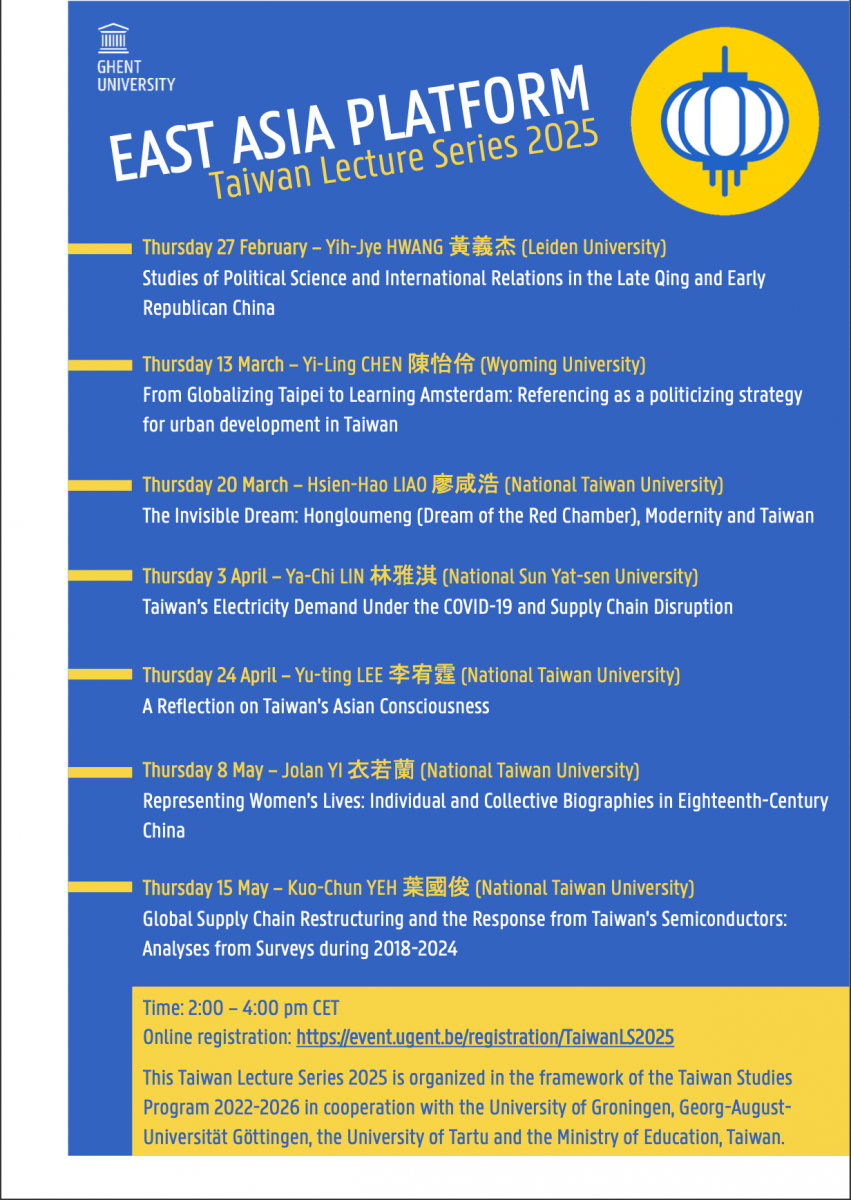
International Conference on "Ming 命 as life-conditioning force and as malleable fate: Perspectives from old(er) age"


Ming 命, often translated as ‘command’, ‘allotment’, ‘fate’, and more generally ‘life’, has up till today deeply pervaded Chinese societies. Within its continuous development in the three teachings (Confucianism, Daoism, Buddhism), ming has seen most of its intellectual debate in Confucian and later Neo-Confucian thought. In folk belief, ming knowns many interpretations and related practices, such as geomancy (fengshui 风水), fortune telling (suanming 算命), and face and palm reading (mianxiang 面相; shouxiang首相).
The dynamics of ming as both a metaphysical life force and as a kind of malleable fate rooted in the three teachings is well documented in the following expression attributed to late Qing literatus Wen Kang: “一命二运三风水四积阴德五读书六名七相八敬神九交贵人十养生”. This expression literally sums up ten factors that are part of or influence one’s ming, containing both practical and spiritual elements: 1. Ming 命(which is unchangeable, inborn); 2. Luck (yun) 运 (which fluctuates); 3. Geomancy 风水; 4. Accumulating hidden merits through virtue 积阴德; 5. Study 读书; 6. Fortune-telling based on one’s name 名; 7. Hand and face reading 相; 8. Praying 敬神; 9. Knowing important people 交贵人; 10. Nourishing life practices 养生. What this saying reflects, is the assertion that life events are preset by external forces, but that there are ways for people to foretell and influence the negative impact of these forces. In other words, from the perspective of the spiritual legacy inherent in cosmology, folk practices, everyday rituals, and ethical code of the three teachings, ming can be perceived as a dynamic concept. It entails both agency through self-development (xiushen 修身) and fate management practices to influence one’s malleable fate (mingyun命运), alongside self-transcendence through knowing, accepting, and surrendering to one’s innate calling (tianming 天命).
In this process, ming related concepts and understandings also appear to be age, experience, and maturity related. Famous in this respect is the saying by Confucius in which he admits to “understand (and accept) tianming 知天命” only at the age of 50 (Analects 2/4, 五十而知天命), and to be able to follow it without going astray only at the age of 60. The saying not only illustrates how ming remains important throughout one’s life, but also how “knowing tianming” implies a state of moral maturity and wisdom that can only be acquired through years of conscious self-cultivation.
This conference will focus on perspectives from old(er) age on the notion of ming, discussing literary, philosophical, religious, medical, and popular writings and folk practices that reflect ways of thinking about and dealing with ming in the process of ageing.
The goal of this interdisciplinary workshop is to bring together scholars from diverse fields including (intellectual) history; philosophy; literary studies; social, linguistic, and cultural anthropology; Chinese medicine; cultural psychology; and religion, to reflect on ageing and ming, both as a life-conditioning force and as malleable fate from their areas of expertise.
Possible topics for discussion include, but are not limited to, the following:
Philosophical treatises of ming related to age(ing) and processes of self-cultivation; Literary depictions and reflections in the Classics and other literary sources on ming and later life, e.g. related to retirement, illness, death...;Insights from anthropology into older people’s relation to their ming, e.g. in relation to disease, lived fortunate and unfortunate events, fate management practices...;Well-known proverbs and sayings that reflect the relation of ageing/later life/death and ming, e.g. 生死有命,富贵在天 (Analects 12/5);Investigation into the use of ming in popular sources on older age or by aged people, e.g. how is ming discursively deployed in common parlance about and by elderly;Medical perspectives, e.g. the concept of 补命 and age.
Organizers
-
Prof. Bart Dessein (Ghent University)
-
Dr. Mieke Matthyssen (Ghent University)
-
Prof. Jessie Dezutter (KU Leuven; director Meaning Research Late Life)
Scientific Committee
-
Prof. Bart Dessein (Ghent University)
-
Prof. Kerstin Storm (University of Münster)
-
Dr. Mieke Matthyssen (Ghent University)
-
Dr. Vytis Silius (Vilnius University)
-
Prof. Jessie Dezutter (KU Leuven; director Meaning Research Late Life)
Practical information
Speakers will be given 20’, with 30-40’ ’ for group discussion and exchange.
Conference fee will be 80 Euro. Instructions for payment will follow upon paper acceptance.
Please note that participants are responsible for their own travel and accommodation arrangements and payment.
For all questions, please contact mieke.matthyssen@ugent.be
The full programme is available here programme_mingconference_dec2024
https://congrezzo.ugent.be/uploadedfiles/bookofabstracts_ming_dec2024.pdf
Here you can find the Book of Abstracts
Venue
De Abt, Lange Kruisstraat 4, 9000 Gent
(“The Abbot”, a picturesque building at the historic centre of Ghent, conveniently located at 2’ walking from the Ibis Sint-Baafs Hotel).
International Seminar Summer School in the Framework of the international "Consortium for Health Humanities, Arts, Reading & Medicine (CHARM)"
"Cross-cultural explorations into the role of fate, destiny and predestination as agents for health and wellbeing."
This three-day interdisciplinary summer school delves into the complex interplay between cultural "beliefs" in fate, destiny, and predestination and their impact on individual wellbeing. A particular focus will be on (comparative) Eastern and Western cultural contexts.
Time: 16-18 September 2024
Venue: Museum dr.Guislain, Josef Guislainstraat 43B, 9000 Gent
EU – East Asia Relations in a Shifting Global Order II∗
Ghent University Egmont Institute National Taiwan University
R602, College of Social Sciences, NTU
∗ Financial support by FWO (VS01123N), National Science and Technology Council of Taiwan (NSTC 113-2927-I-002-502), Taiwan Social Resilience Research Center (Grant no. 113L900302) from the HESP by the MOE in Taiwan, Taiwan Foundation for Democracy, and EU Jean Monnet Chair program is acknowledged.
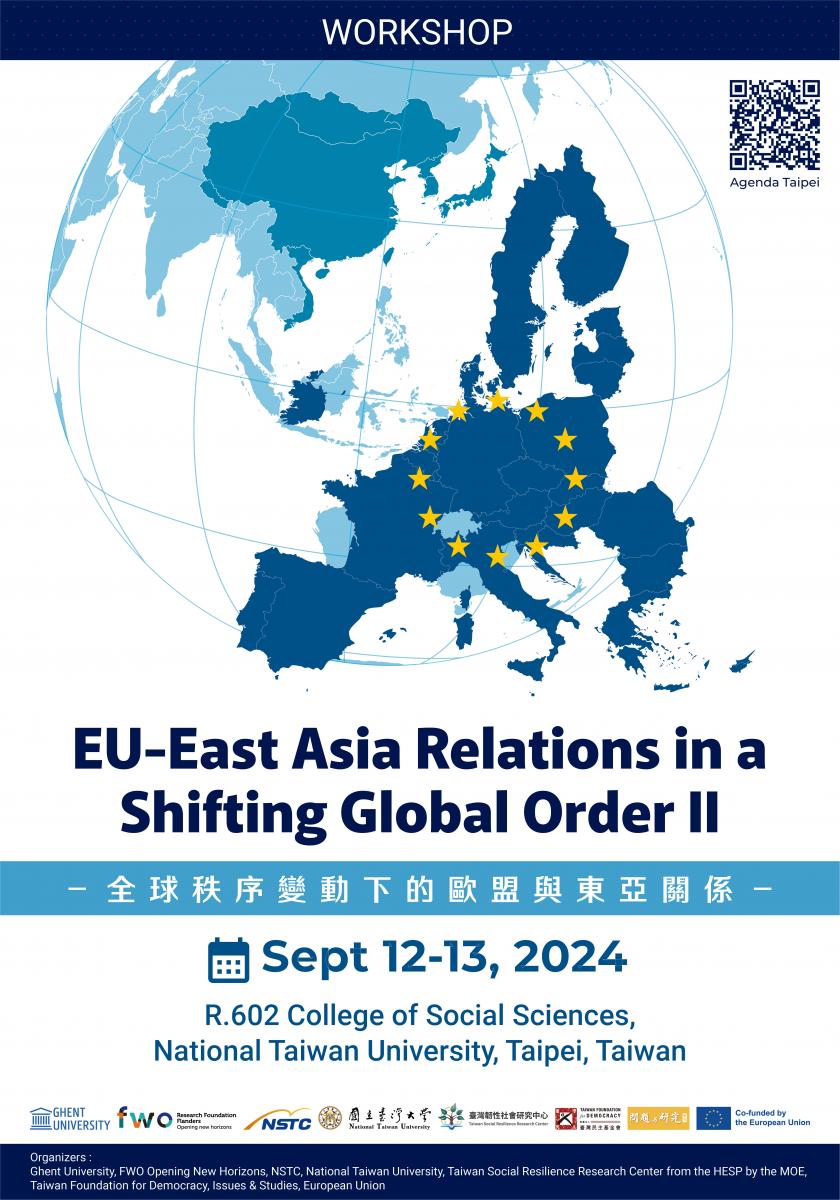
Agenda
September 12, 2024
Opening Remark (09:10-09:20)
Prof. Dr. Yutzung CHANG (Dean, College of Social Sciences, National Taiwan University)
Prof. Dr. Bart DESSEIN (Ghent University & Egmont)
Session 1 Europe and the Cross-strait Interaction (09:20-10:50)
Chair: Sven BISCOP (Ghent University & Egmont)
1. Sven BISCOP (Ghent University & Egmont): This is not a new world order – Europe
rediscovers geopolitics, from Ukraine to Taiwan.
2. Bart DESSEIN (Ghent University & Egmont): Marshal Ye Jianying’s ‘nine points’
revisited.
3. Catherine LI (EU Jean Monnet Chair, Soochow University): The European Union’s
deforestation-free regulation and the trade disputes with Asian countries under
the WTO rules.
Coffee Break
Session 2 Geopolitical and Security Issues (I) (11:10-12:40)
Chair: Chih-mei LUO (EU Jean Monnet Chair, National Taipei University)
1. Chi-chung KAO (National Taipei University of Business) and Chih-mei LUO (EU Jean
Monnet Chair, National Taipei University): International norms of sustainable
investment framework: Comparing the WTO investment facilitation agreement
and the EU's ESG directive.
2. Jason FAN (Graduate Institute of National Development, NTU): Geopolitical risk
and Taiwan’s national defense expenditure: A VAR analysis.
3. Yun-chen LAI (National Dong Hwa University): EU's economic agreements and
normative practice in the Indo-Pacific region: comparison of EU-China CAI and
EUVFTA.
Lunch Break (12:40-14:00)
Session 3 Geopolitical and Security Issues (II) (14:00-16:00)
Chair: Yun-chen LAI (National Dong Hwa University)
1. Victor De DECKER (Ghent University & Egmont): Europe’s turn towards Economic
Security.
2. Yang LI (Ghent University): How to interpret ‘strategic autonomy’ (Zhanlüe zizhu 戰
略自主) in China's foreign policy discourse towards the EU in the context of post-
2012 Sino-US rivalry?
3. Hsiao-chi HSU (National Taiwan Normal University) and Tse-hsin CHEN (National
Taipei University): Assessing the EU's Indo-Pacific strategy: Progress and challenges.
4. Yunyun CHANG (National Dong Hwa University): Navigating digital sovereignty:
EU’s influence in the Indo-Pacific.
Coffee Break
Session 4 Economic Issues (16:20-17:50)
Chair: Chueiling SHIN (National Sun Yat-sen University)
1. Chueiling SHIN (National Sun Yat-sen University): TBC.
2. Ngoc Diep NGUYEN THI (Graduate Institute of National Development, NTU):
Assessing the impact of the European Union-Vietnam Free Trade Agreement
(EVFTA) on institutional reform in Vietnam.
3. Shin-Hui CHEN (Chung Hua Institute for Economic Research): Is the EU regaining
global influence through CBAM? Insights from Taiwan's supply chain survey data.
Dinner (18:30-)
September 13, 2024
Session 5 Culture and Normative Issues (09:30-11:00)
Chair: Bart DESSEIN (Ghent University & Egmont)
1. Jasper ROCTUS (Ghent University & Egmont): Sun Yat-sen and cross-strait
relations: From the anti-communist 'The Three Principles of the People Unite
China' (三民主義統一中國) to symbol of Cutong (促統).
2. Yu-Zhou WANG (Ghent University): Chinese companies 'going out’ under
fragmented authoritarianism.
3. Kuo-chun YEH (EU Jean Monnet Chair, NTU) and Ya-chi LIN (National Sun Yat-sen
University): EU’s industrial and trade policies in a decade: From ‘Trade for All’ to
‘Five Initiatives’ and the impact on Indo-Pacific supply chains.
Concluding and Plan for a Special Issue (11:00-11:30)
Prof. Dr. Bart DESSEIN (Ghent University & Egmont)
Prof. Dr. Kuo-chun YEH (EU Jean Monnet Chair, NTU)
Lunch & Optional Tour (NTPU and the old street in Sanshia)
Note:
1. This workshop will be in English. Please send your draft (if available) or ppt by
September 1, 2024 to Ms. Nguyen (d08341002@ntu.edu.tw).
2. We will explain the details of the special issue (Issues & Studies by National
Chengchi Univserty) after the workshop. Note that your submission can be in
English or traditional Chinese.
3. Please feel free to send a message to Kuo-chun YEH (kuochunyeh@ntu.edu.tw) if
any question.

Workshop "EU - East Asia Relations in a Shifting Global Order"
In the framework of an FWO-MOST (Taiwan) agreement, the workshop 'EU - East Asia Relations in a Shifting Global Order' was organized on 12 and 13 September 2023 at venue: 'De Abt', Lange Kruisstraat 4, 9000 Gent.
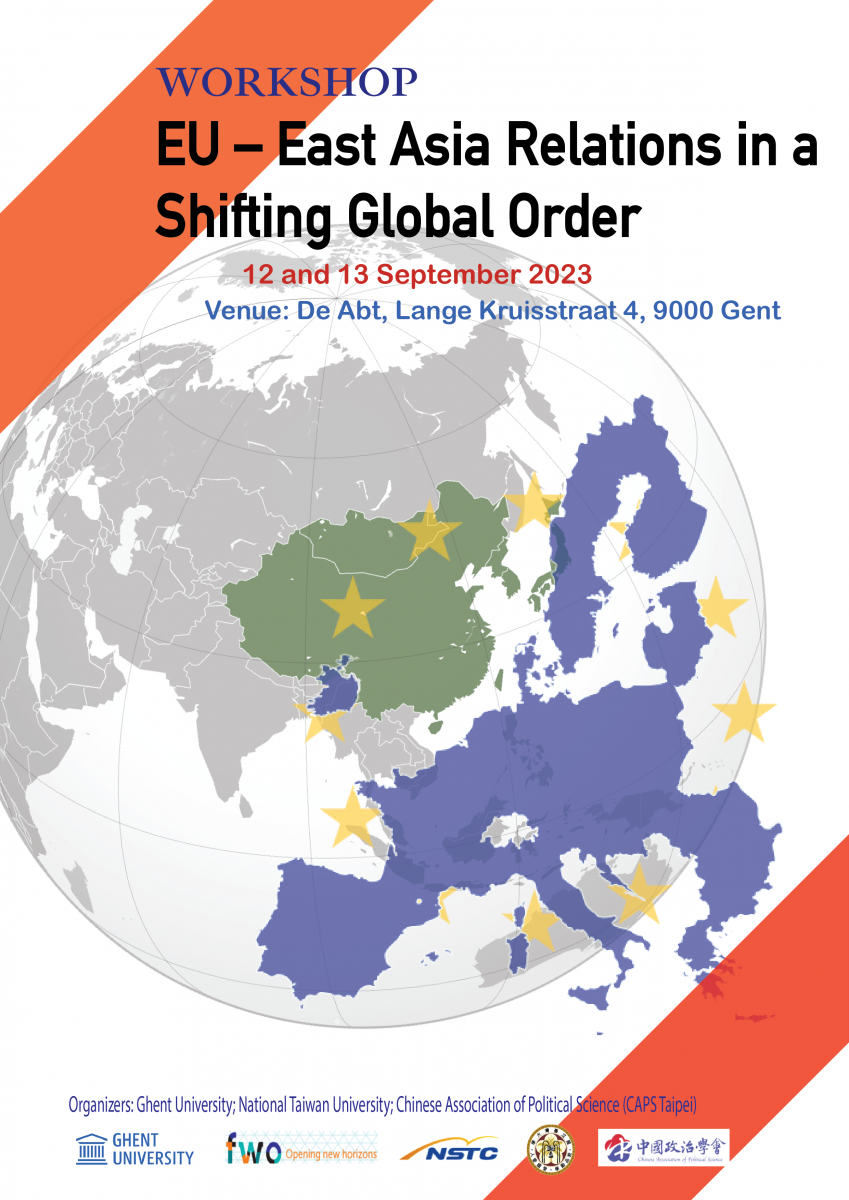
September 12, 2023
-
Opening Remark (09:00-09:20)
Prof. Dr. Bart DESSEIN (Ghent University)
Representative of International Relation Office, Ghent University
Prof. Dr. I-Ling CHANG (Director of NSTC, Taipei Representative Office in the EU)
Prof. Dr. Chin-peng CHU (Monnet Chair and President, CAPS Taipei)
-
Session 1 Europe and the Cross-strait Interaction (09:20-10:50)
Chair: Sven BISCOP (Ghent University)
1. Sven BISCOP (Ghent University): Global geopolitics in shift: The role of the EU, China, and Taiwan.
2. Jasper ROCTUS (Ghent University): The European Union and cross-strait relations: Just what is “its” one-China policy?
3. Catherine LI (Monnet Chair, Soochow University): A closer look at the stagnant multilateral investment court system and 2022 ICSID Arbitration reform: Mapping concerns of East Asian countries and how to address them.
-
Session 2 Geopolitical and Security Issues (I) (11:10-12:40)
Chair: Chin-peng CHU (Monnet Chair and President, CAPS Taipei)
1. Chi-mei LUO (Monnet Chair, National Taipei University): Reflecting Zeitenwende or reconfirmation with convention: Germany’s Indo-Pacific policy and how far can it go?
2. Jieqiong DUAN (Ghent University): “EU-China security relations: A role-based perspective”
3. Yun-chen LAI (National Dong Hwa University): “EU’s Indo-Pacific Strategy: A chance for EU-Taiwan BIA?”
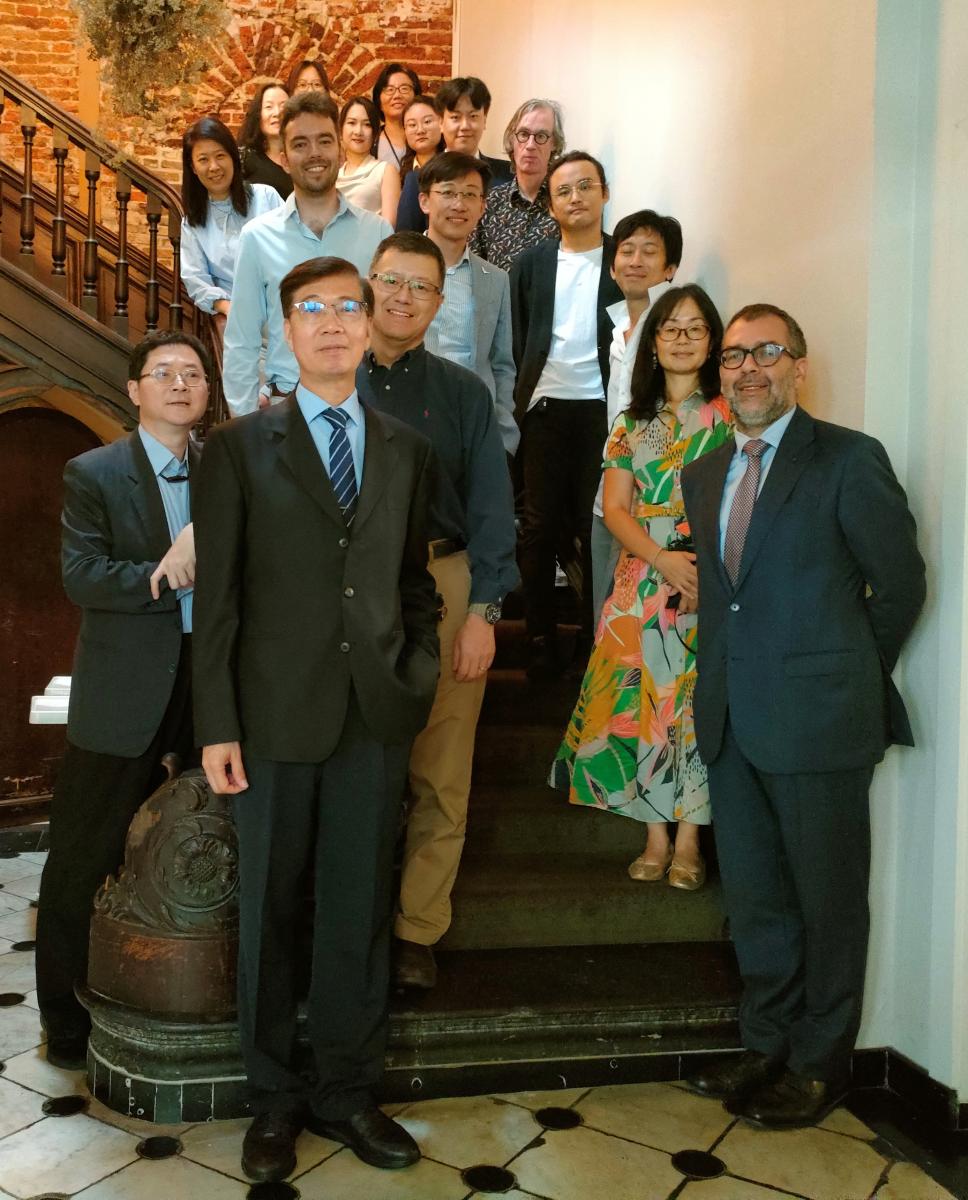
-
Session 3 Geopolitical and Security Issues (II) (14:00-16:00)
Chair: Nanae BALDAUFF (UNU Institute on Comparative Regional Integration Studies, UNU-CRIS)
1. Nanae BALDAUFF (UNU Institute on Comparative Regional Integration Studies (UNU-CRIS)): Examining Japan's Free and Open Indo-Pacific vision update: Reboot or continuity?
2. Yang LI (Ghent University): To what extent does the evolution of the Civil Service Recruitment Requirements In China's MFA represent a change in China's foreign policy after 2019.
3. Tian GAO (Ghent University): Ontological security and chaos: China's Postition in multilateral order in the era of Xi Jinping
4. Shiang-yuan CHU (Giessen University): EU’s strategic autonomy and EU’s Indo-Pacific strategy: Implications of new era EU-China relations.
-
Session 4 Culture and Normative Issues (16:20-17:50)
Chair: Bart DESSEIN (Ghent University)
1. Bart DESSEIN (Ghent University): A logic of relationship or a logic of appropriateness?
2. Yu-Zhou WANG (Ghent University): On the Tianxia (all-under-heaven) theory.
3. Yih-Jye HWANG (The Hague College Leiden University): Re-examining the Belt and Road Initiative under the framework of China-CEEC cooperation: A moral realist analysis.
September 13, 2023
-
Session 5 Economic Issues (09:00-10:30)
Chair: Chi-mei LO (Monnet Chair, National Taipei University)
1. Brandy MILLER (Ghent University): From diplomatic arbitration to economic sway: Examining EU-Taiwan relations in the context of US-China competition.
2. Huanyu ZHAO* (Ghent University) and Xiaoyu PU (University of Nevada): Decoupling, De-risking, and Reconnecting China: Epistemic Communities, Knowledge Production, and Reframing of EU Foreign Policy.
3. Ya-chi LIN* (Feng Chia University) and Kuo-Chun YEH (Monnet Chair, National Taiwan University): The impact of Russo-Ukrainian war on the EMU’s divergent risk: Empirics and policy implications.
4th Biennial Conference of the European Association for Chinese Philosophy (EACP): “Interpretation and Reinvention of Chinese Philosophy.”

The conference brought together esteemed scholars, philosophers, and enthusiasts from around the world to share their ideas on the rich traditions of Chinese philosophy under new perspectives. It was a great opportunity for scholars and young researchers of the research group ‘East Asian Culture in Perspective: Identity, Historical Consciousness, Modernity’ and of the research group ‘Ghent Centre for Buddhist Studies’ of the Department of Languages and Cultures'', Ghent University to engage in captivating keynote lectures and thought-provoking discussions, gaining insights that can be applied to modern life and personal growth. They contributed to 6 panels with 10 presentations on various themes.
Chinese Philosophy in Mainland China and Taiwan 1
Panel Convener and Chair: Jasper Roctus
- Jasper Roctus (Ghent University), “Ossified Educational Text or Proto-Communist Minimum Program? (Re)interpretations of Sun Yat-sen’s Three Principles of the People (San min zhuyi 三民主義) by Mao Zedong and Chiang Kai-shek (Late 1920s-Early 1970s”
- Li Yang (Ghent University), “The KMT’s Shifting Approach to the Outside World during the 1920s: Reinvention of Chinese Confucianism”
- Wang Yu-Zhou (Ghent University), “(Re)inventions of China: Reviewing the Debate between Mind- nature Confucianism (xinxing ruxue 心性儒學) and Political Confucianism (zhengzhi ruxue 政治儒學 ) in the 21st Century”
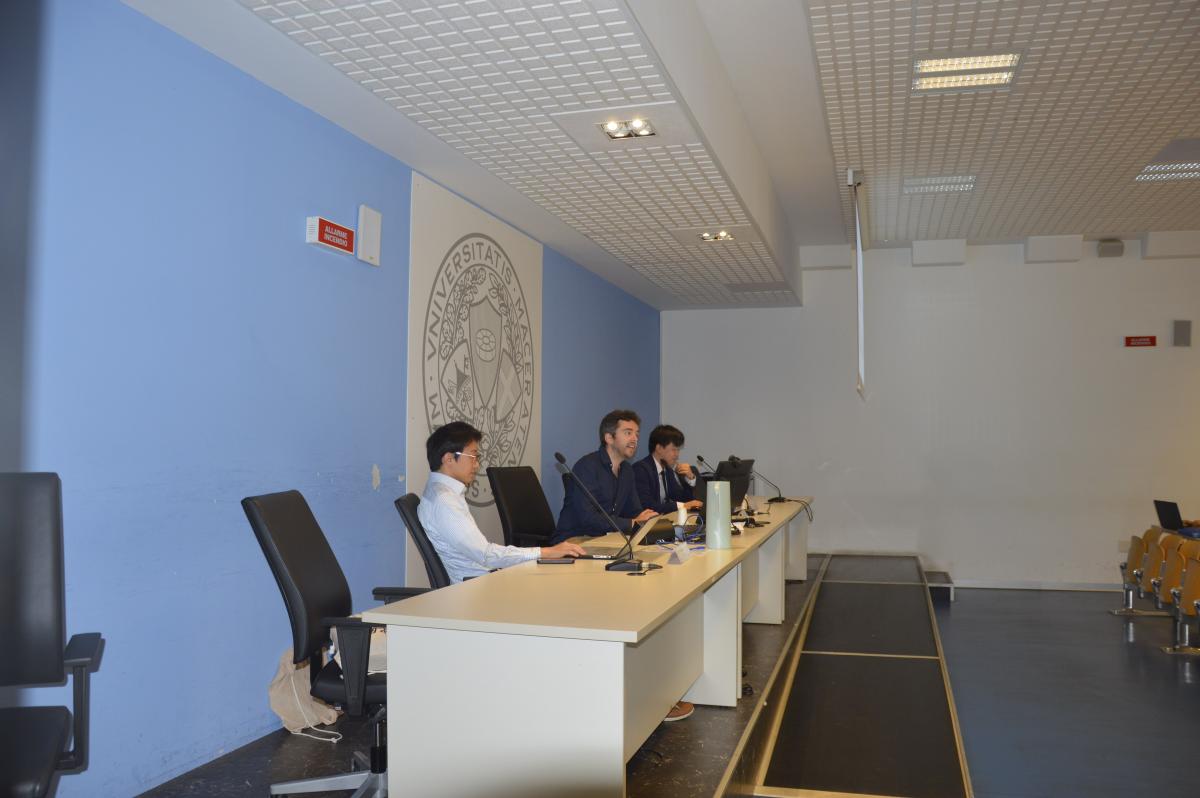
Chinese Philosophy in Mainland China and Taiwan 2
Panel Convener and Chair: Jasper Roctus
- Zhao Huanyu (Ghent University), “Fifty shades of (In)Justice: The Evolution of Confucian Justice Theory and its Global Impact”
- Bart Dessein (Ghent University), “Reinterpreting Christianity, Nationalism, and Socialism with the aim to Reinvent Buddhism”
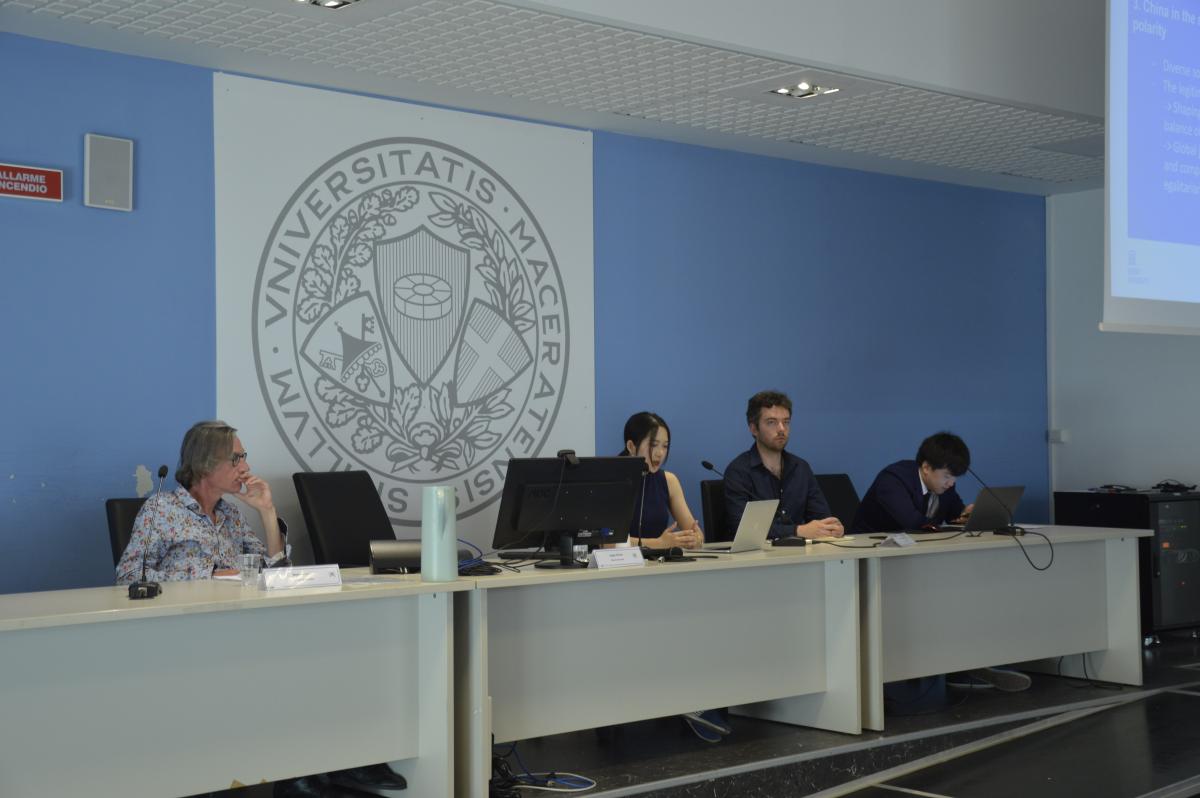
Visions of Modern China: Politics
Ady Van den Stock (Ghent University), “Xiong Shili’s (1885-1968) Political Ontology in Maoist China”
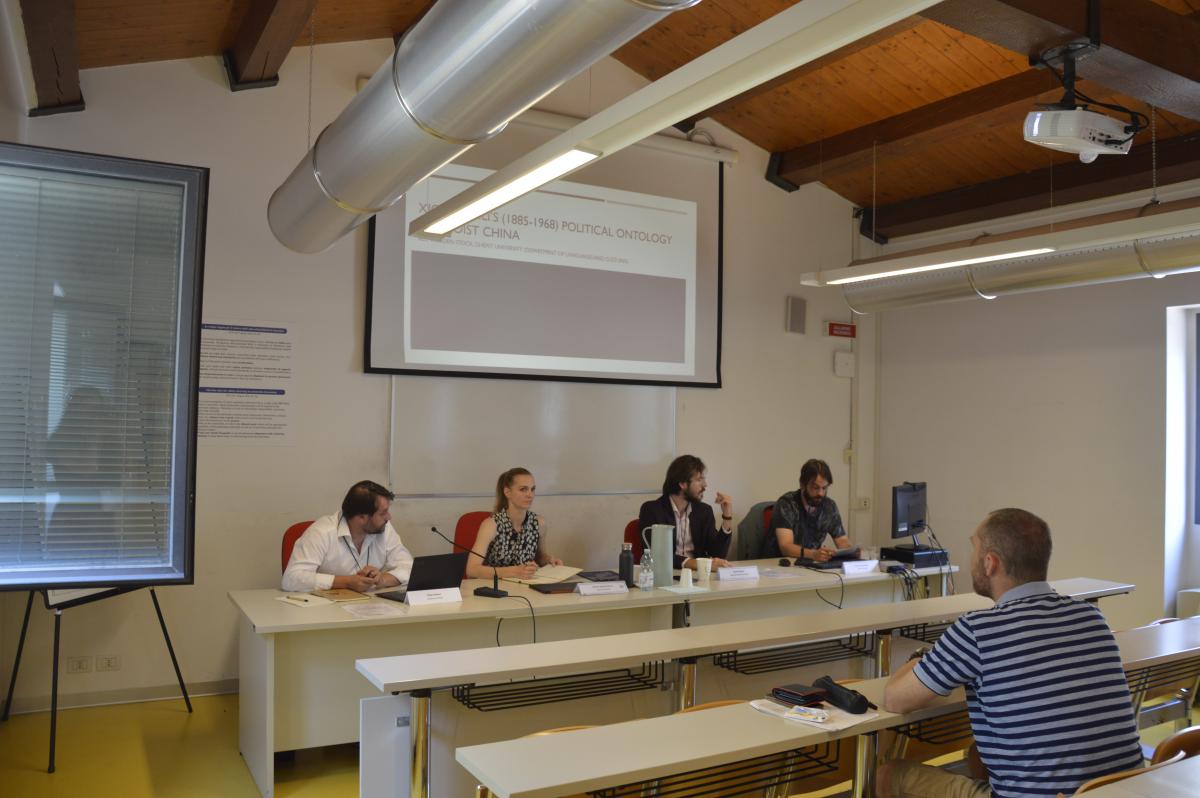
Ming and Qing Neo-Confucianism: Expansion and Criticism
- Nguyen Khuong Hong Ngoc (Ghent University), “Syncretic Philosophy in 18th Century Vietnam: The Chinese Neo-Confucian Influence on Le Quy Don’s Categorized Sayings from the Van Terrace (芸臺類語)”
- Zou Xiaozhou (Ghent University), “Things, Knowledge, and Oneness: Fang Yizhi’s Philosophical Tendency”
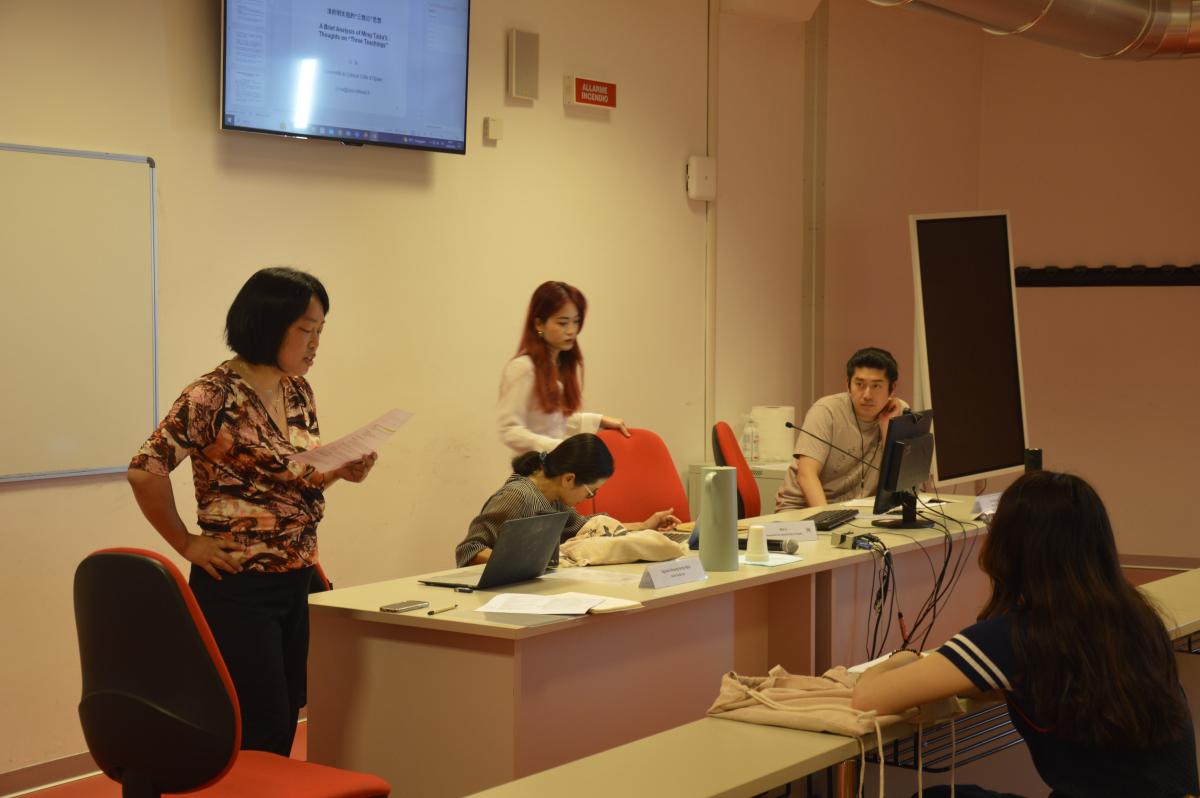
Chinese Buddhism Among Revivals and Rethinking
Anna Sokolova (Ghent University), “The Revival of the Tiantai Doctrine in Tang China: Patriarchs, Polemics, Places of Practice”
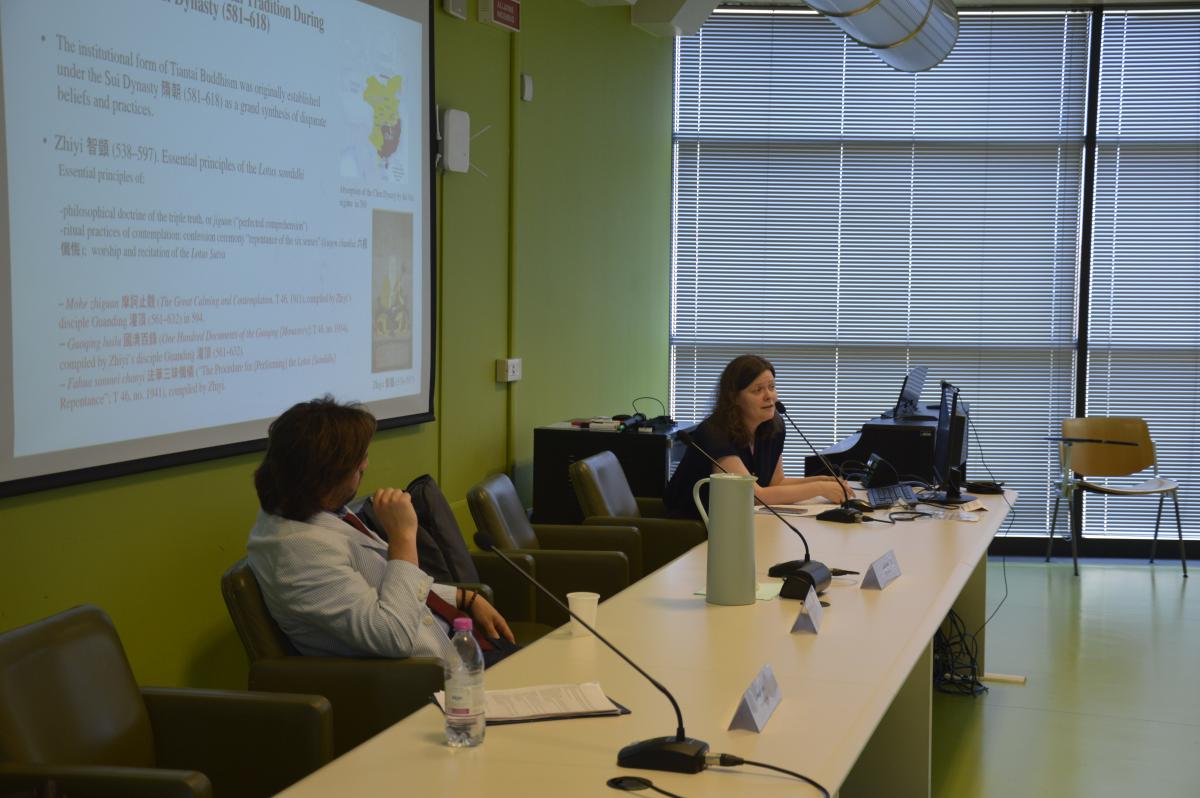
Mediating Buddhism in Ancient and Modern China
Chair: Bart Dessein (Ghent University)
- Massimiliano Portoghese (Ghent University), “Propagating Buddhist Customs through the Classics. Discursive Strategies on Bodily Issues Controversies”
- Matteo Sgorbati (University of Perugia / Ghent University), “The Buddhist Understanding of Unconscious Cognition in Early Twentieth Century China”
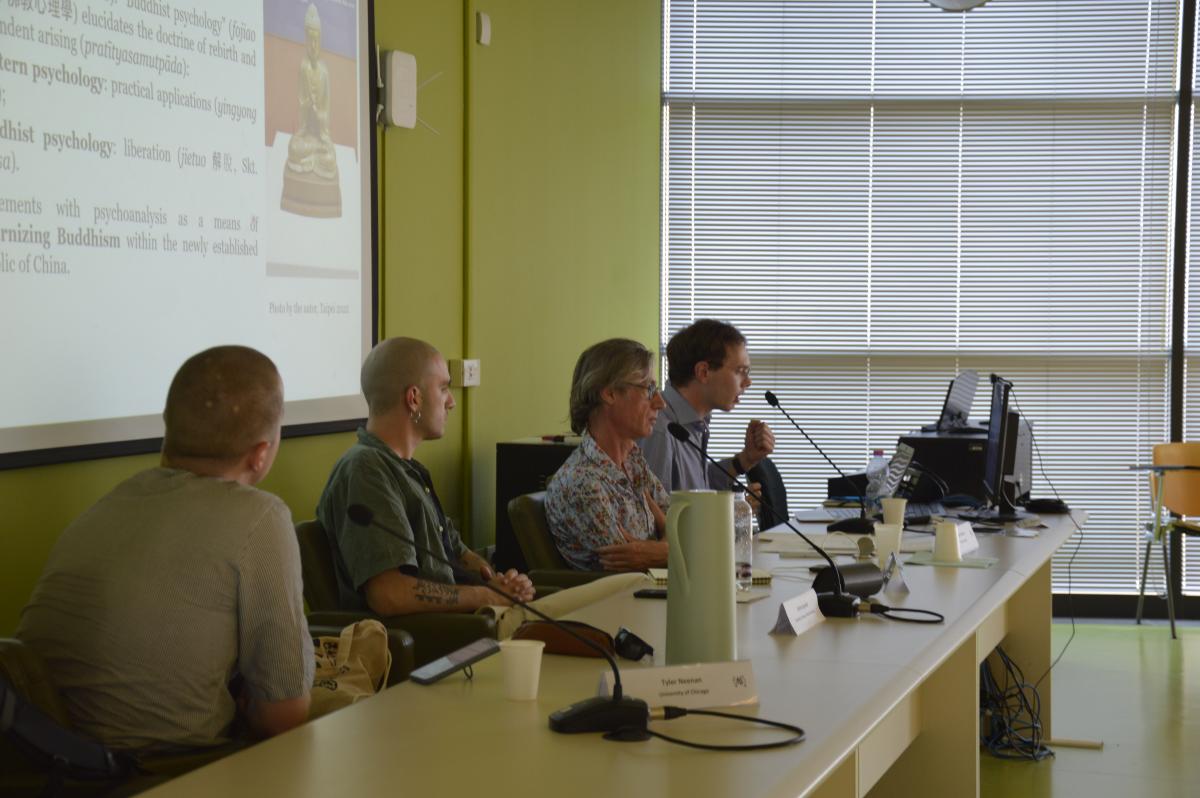
Workshop "Words and Interpretation: Comparative Approaches to Chinese Literature and History
Participants of the workshop "Words and Interpretation: Comparative Approaches to Chinese Literature and History” (May 31–June 1, 2023) organized in the framework of the Taiwan Chair Programme ((Ghent University, the University of Groningen, the Georg-August Universitat Göttingen / Georg-August Universitat Göttingen Stiftung Öffentliches Rechts, the University of Tartu, and the Department of International and Cross-Strait Education, Ministry of Education, Taiwan)

Programme DAY 1: 31 MAY
10.00 - 11.00:
- Opening: Representative DICE
- Introductory lecture: “Beyond Words and Interpretation” (Bart Dessein, UGent)
11.30-12.30
Digital Humanities Round Table: Hou-leong Ho (East-Asian Department of Berlin State Library): “Introducing Open Access Resources for Sinology and Taiwanese Studies in Taiwan and CrossAsia”
14.00-15.30
-
Session 1: Culture and Language
Chair: Bart Dessein
- Táňa Dluhošová (Oriental Institute of the Czech Academy of Sciences, Prague): “Quantitative study of Taiwanese political elites from the perspective of Taiwanese and Chinese sources”
- Peiying Lin (HKU, ONLINE): “Manchuria as a site of cultural exchange: The China-Taiwan literary encounters under Japanese rule”
- Mieke Matthyssen (UGent): “Dimensions of ming 命: changing roles of one’s moral mission (tianming天命) and one’s partly malleable fate (mingyun命运) in contemporary China”
16.00-17.30
-
Session 2: Gendering Chinese History
Chair: Mieke Matthyssen
- Jolan Yi (NTU, Taiwan): “Taiwanese widows went to court under Qing rule”
- Ping Yao (California State University): “Approaching women’s history and gender history: Mainland China, Taiwan, and beyond”
- Shuran Zhang (VUB): “The struggle and dilemmas of the Chinese women’s suffrage movement around the 1911 Revolution”

DAY 2: 1 JUNE
9.30-11.00
-
Session 3: Historical Interpretations: Late Qing and REPUBLICAN China
Chair: Huanyu Zhao
- Alexandre Tsung-ming Chen (KU Leuven): “The Uprising in the Eastern Rehe in 1891: Different visions and changing interpretations in the historians’ circle of our time”
- Jasper Roctus (UGent): “How Sun Xiansheng became Guofu: The KMT’s deification of Sun Yat-sen during the Second Sino-Japanese War (1937–1945)”
- Yang Li (UGent): “Studies and gaps of existing literature on the evolution of diplomatic thought in the late Qing (1840-1914)”
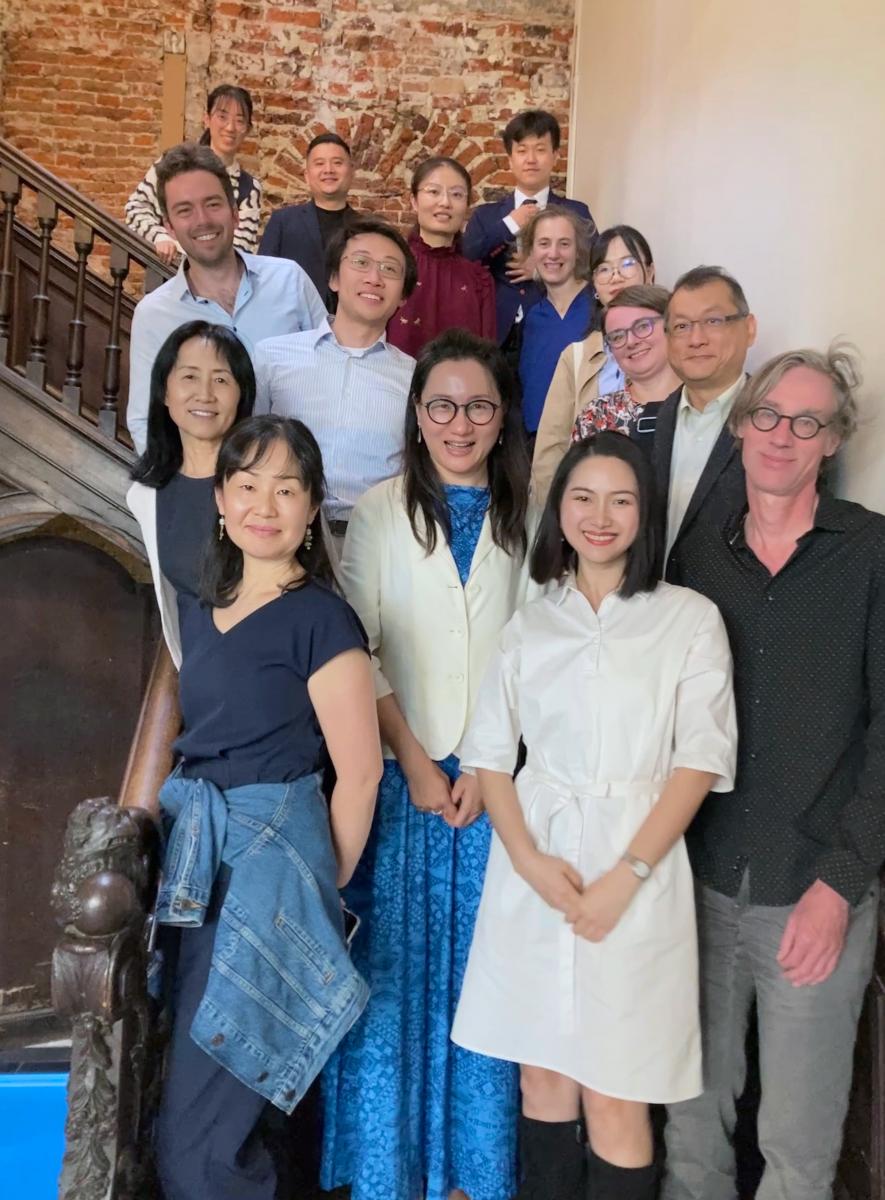
11.30-13.00
-
Session 4: Political Narratives in contemporary China and Taiwan
Chair: Jasper Roctus
- Yuzhou Wang (UGent): “Tracing ‘Chinese School of IR’: Reviewing the interpretations of tianxia in contemporary China and Taiwan”
- Huanyu Zhao (UGent), Xiaochuan Sang (Shanghai University of Political Science and Law): “Strategic narratives on cross-Strait relations“
- Nanae Baldauff (UNU-CRIS): “Japan's security relationship with China: hovering between political objectives, security concerns and Taiwan issue”
Workshop "Ghent-National Sun Yat-Sen University Dialogues in Global Sinology: Solidarity and Connections in Time of Crisis - 根特-中山國際漢學對話:危機時刻的聯結與凝聚"
30 May 2023

國立中山大學代表 NSYSU Representatives
- 莫加南 Mark MeConaghy. Department of Chinese Literature, Center for the Humanities
- 吳孟兼 Wu Mengqian, Department of Chinese Literature
- 謝筱娜 Severina Balabanova, Department of Chinese Literature
根特大學代表 Ghent University Representatives
- Bart Dessein, Professor, Faculty of Arts and Philosophy
- Mieke Matthyssen, Doctor, Faculty of Arts and Philosophy
- Yu-Zhou Wang, PhD Candidate, Ghent University, Faculty of Arts and Philosophy